Are beans very starchy?
Are beans very starchy is a question often heard; what are the facts?
Here is 100g mixture of limas and broad-beans, after podding that I reaped from the garden this morning; that is half a cup. Just what will they do to your blood glucose?
Will they make you fat?
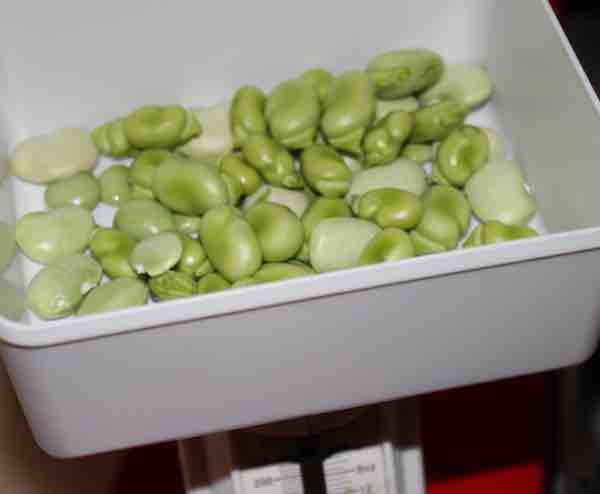
This page was last updated by Bernard Preston on 8th January, 2025.
As a rule of thumb, half a cup of beans contains about 15g of starch; much of it is in the form of fibre that is not digested in the small-intestine.
It is known as "resistant starch;" the net carbs are low.
In comparison most of a slice of commercial
bread which also contains about 15 grams of starch would be absorbed
in the small-bowel causing a blood sugar surge; but instead most of the
resistant carbs in your fresh green beans pass through to the colon. I cannot
vouch for those that have been dried in the sun or are from a can; or have been skinned.
Skinning broad beans
Broad beans are also known as favas; unless eaten very young they are quite chewy. So many people skin them; the resistant starch is removed and they become highly glycemic.
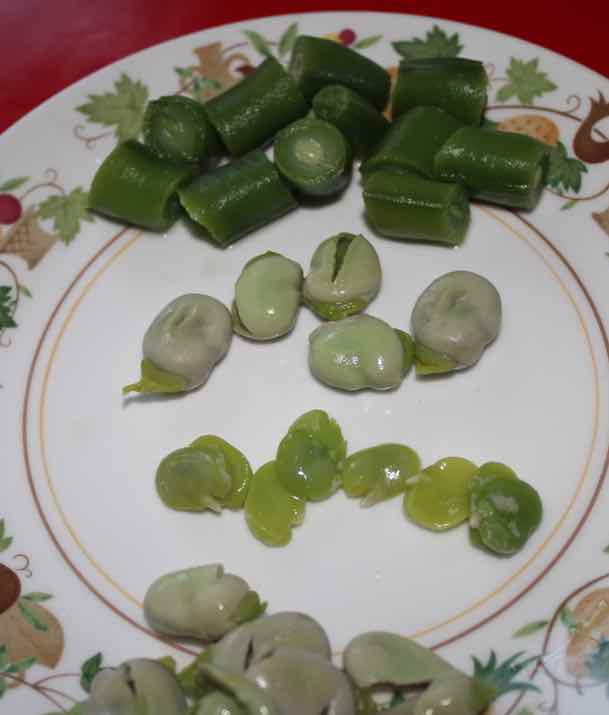 Skinning broad beans ruins them
Skinning broad beans ruins themHumans incidentally have a very long small-intestine compared to other primates; we are able to absorbe glycemic carbohydrate efficiently, turning it into glucose and storing it as fat.
But the carbohydrate in legumes is what is known as resistant-starch; instead most is fermented in the colon, provided you have an adequate normal flora, known as the microbiota in scientific jargon. Those are the friendly bacteria and yeasts that break down the fibre which has escaped digestion and absorption as glucose in the small intestine.
In comparison half a cup of pumpkin contains about 5g; one-third of the starch. Leafy greens are not dissimilar; again much is fibre.
An apple, 1/2 cup of cooked carrots and butternut also contain 15g of carbohydrate; and corn too. That's about the same as the so-called "very starchy beans."
One cup of milk or unsweetened-yoghurt contains about 12g of carbohydrate; all will be absorbed in the small intestine.
One can of beer contains about 15g of carb and a cola 40 grams. Avoid artificial sweeteners, by the way; they are even worse than sugar when it comes to insulin-resistance and the wellness of the microbiome.
One slice of bread also contains about 15g.
In
comparison one-slice of cheesecake contains 33g of starch plus 22 of
sugar; 55 grams altogether, about the same as in two whole cups of beans but unlike legumes that would not be resistant. All would be absorbed in the small intestine immediately causing a surge in blood glucose.
Whilst most folk can easily stop at half a cup of beans, a popular website says, "hardly anyone can resist a second slice of cheesecake." (2) There is the double-rub; or should that be squared? Sugar is highly addictive.
"Never attribute to malice that which is adequately explained by stupidity."
- Hanlon’s Razor
Are beans very starchy?
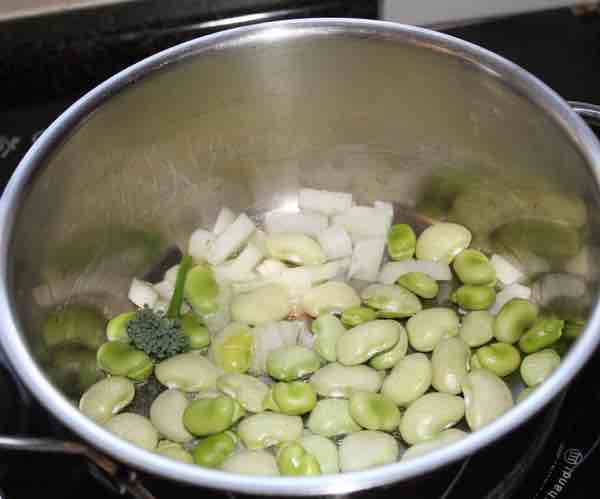
Are beans very starchy and should we be avoiding them if we want to lose weight or are diabetic?
So yes all legumes do have some carbohydrate but you are never likely to pig-out on beans like you might on cheesecake; and it is nutritious resistant starch that will hardly affect your blood glucose.
If you are frankly diabetic then test yourself. We all react differently to various starches. Part of the secret is to understand how net carbs work; the fibrous fraction does not raise your blood-glucose.
Breakfast cereals
It seems that we are set on cereals for breakfast; but they certainly are starchy, far more so than beans and will significantly raise blood-glucose and the risk of diabetes. Especially since they are highly refined and thus tasteless; copious amounts of sugar have to be added.
Many breakfast-cereals are just cracked biscuits.
For some years we have rather been enjoying Eggs Florentine for breakfast; poached on a bed of spinach and often with a slice of buttered or pan-fried toast. It has almost no effect on blood sugar, is delicious and quick to make; and supplies amazing satiety. You don't constantly feel hungry.
Having said that, the toast is made from "real" bread baked with 100% wholemeal that we grind ourselves; all three streams of the bran, germ and flour.
The allicin-benefits in the onions certainly also counteract any possible negative effects for diabetics.
A wonderful upgrade to Eggs Florentine has been the addition of limas and favas as they are often known; since beans are marginally starchy but have little effect on blood-glucose. Understanding net carbs is what it's all about.
First fry an onion in butter, add a hot-pepper and the green beans; after a couple minutes pop the sliced spinach into the pot. Pour on a few tablespoons of water and then when lightly steamed, drop in the eggs.
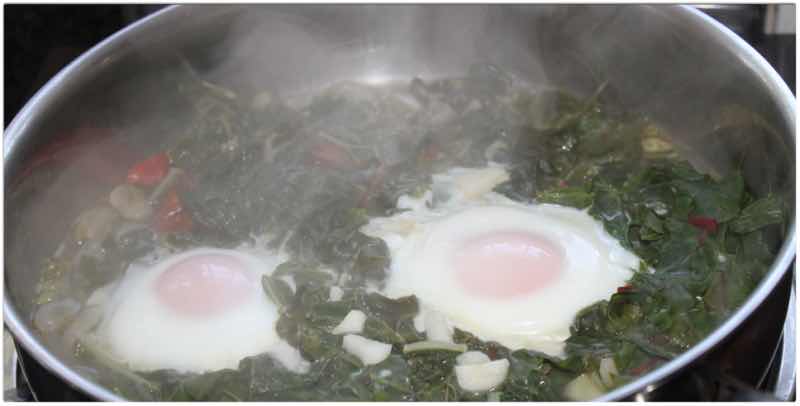
One of the great joys of fava-beans is their dopamine content; it hits the hunger centre of the brain and you will not feel famished for the rest of the day. It's known as the "happy hormone."
Are beans very starchy? No, only mildly so and in comparison with cheesecake they are low in carbohydrate.
I will admit that beans out of a can or days old from the greengrocer may be another story. I am making a case for those grown in your own garden, or freshly-picked from a farmers' market.
Eggs Hilton is our daily breakfast. I give it much of the credit that we take no medication and in our mid-seventies both of us are vigorous and strong. It contains all four of the very important vitamins that are needed to prevent frailty syndrome.
The key to frailty-syndrome[3] is prevention, not a cure. Is granny too getting those four vitamins?
Vegetable high in protein
Much of the focus in the media surrounds the question are beans very starchy; and are they fattening? No, they are not. What is the glycemic response to legumes is another question you may be asking?
But just as important is that many of the fad diets are encouraging you rather get your protein from red meat or heaven-forbid a shake.
It is a rather invidious decision that you have to make; are you going to avoid legumes because you are concerned about whether beans are very starchy, and might make you fat? Or will you embrace vegetable high in protein and lower the risk of getting metastatic tumours?
Or are you going to eat more meat?
Type "vegetable high in protein" into Site Search in the menu bar above for more information.
Drying these blanched broad beans before freezing will give you a supply for the whole year.
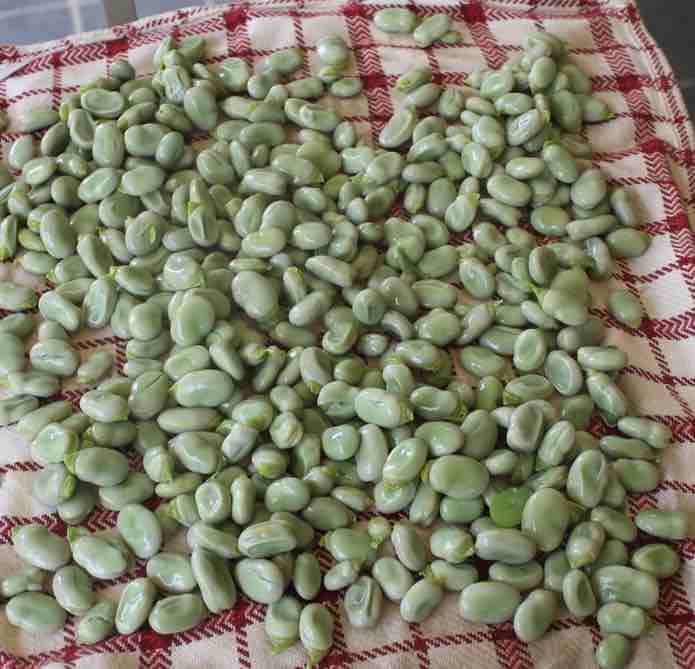
For me it's a no-brainer. Enjoy legumes daily and keep cheesecake for high and holy days; one slice only.
Having
said all of that, if you are morbidly obese then you have to get all
of your carbohydrate under 50g per day; the "starchy-beans" must also
come into the spotlight.
Recent research published in Lancet declares that low carb diets favouring animal-derived protein and fat were associated with a higher mortality; but if you get your starch from legumes, avocados and olives, for example it is associated with a lower death rate.(3)
One cup of lima beans contains 12 grams of protein; about a quarter of the daily requirement of an adult.
In short if you are going to follow a moderately low carb diet which I recommend incidentally, make sure the fats and protein include a significant percentage that are plant-based; like avocados and beans.
Are beans very starchy? Yes, they are and that is why they are so important in your diet.
What
is low carb you may be asking? If your body mass index is less than say
about 27, then enjoy your starch but keep the total well below 150g per day. If it is above 30 then you should be looking at under 100 grams and considerably less
if you are diabetic; much should be "resistant starch."
Cutting your carbs to less than 20g per day, half a cup of beans for a week will enable you to shed pounds very quickly. Legumes supply satiety, as will increased fat so that you will not feel famished. Remember that dopamine in favas; but you really do have to grow them yourself.
I find it absolutely fascinating that in all five blue zones, where ten times as many people live to strong and vigorous old age, they grow and eat fava-beans. No ketogenic diet fan will ever convince me that they are bad for us; but old and starchy they are dreadful.
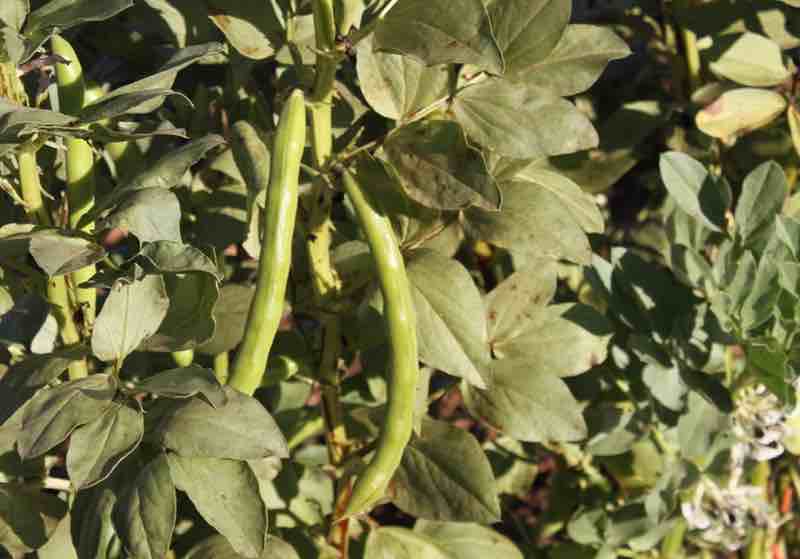 Grow the "happy hormone" beans yourself
Grow the "happy hormone" beans yourselfAnti-nutrients
There are credible questions being asked about anti-nutrients like phytates. I confess my mind is not made up on the subject but they are found in much larger amounts in dried beans. I far prefer them green, straight from the plant in any case so it's not for me an issue.
However these anti-nutrients are central to one of the many ketogenic-diets.
Beetroot
For those still concerned about the effect beans may have on their blood-glucose levels, there is interesting research that beetroot and its juice too delayed the glycemic response after a starchy meal; and reduced the peak.
So I would recommend looking for recipes with beetroot and beans.
Short walks
If you are concerned about the starch in beans and perhaps we all should be, then taking a short walk after meals would be beneficial. Remember that nearly 50% of those enjoying typical grocery store food are prediabetic.
In any case researchers have found that those enjoying five strolls per week, twenty minutes each had 43% fewer days with upper respiratory infections; and the symptoms were far less severe.
It's all about chronically raised blood glucose; it makes the body vulnerable to every passing bug and disease.
Useful links
When browsing use right click and Open Link in New Tab, or you may get a bad gateway signal.
The material expressed on this page is gleaned from the nutritional and environmental literature; it is clearly referenced. A plain distinction is made between the author's opinion and that which is scientifically proven. When in doubt consult your health professional.
To suggest a correction or clarification, write to Dr Bernard Preston here. Contact.
Newsletter
Our newsletter is entitled "create a cyan zone" at your home, preserving both yourself and Mother Earth for future generations; and the family too, of course. We promise not to spam you with daily emails promoting various products. You may get an occasional nudge to buy one of my books.
Here are the back issues.
- Lifestyle and ideal body weight
- What are ultra-processed foods?
- Investing in long-term health
- Diseases from plastic exposure
- Intensive lifestyle management for obesity has limited value
- A world largely devoid of Parkinson's Disease
- The impact of friendly bacteria in the tum on the prevention of cancer
- There's a hole in the bucket
- Everyone is talking about weight loss drugs
- Pull the sweet tooth
- If you suffer from heartburn plant a susu
- Refined maize meal and stunting
- Should agriculture and industry get priority for water and electricity?
- Nature is calling
- Mill your own flour
- Bake your own sourdough bread
- Microplastics from our water
- Alternative types of water storage
- Wear your clothes out
- Comfort foods
- Create a bee-friendly environment
- Go to bed slightly hungry
- Keep bees
- Blue zone folk are religious
- Reduce plastic waste
- Family is important
- What can go in compost?
- Grow broad beans for longevity
- Harvest and store sunshine
- Blue zone exercise
- Harvest and store your rainwater
- Create a cyan zone at your home
Did you find this page interesting? How about forwarding it to a friendly book or food junkie? Better still, a social media tick would help.
Address:
56 Groenekloof Rd,
Hilton, KZN
South Africa
Website:
https://www.bernard-preston.com